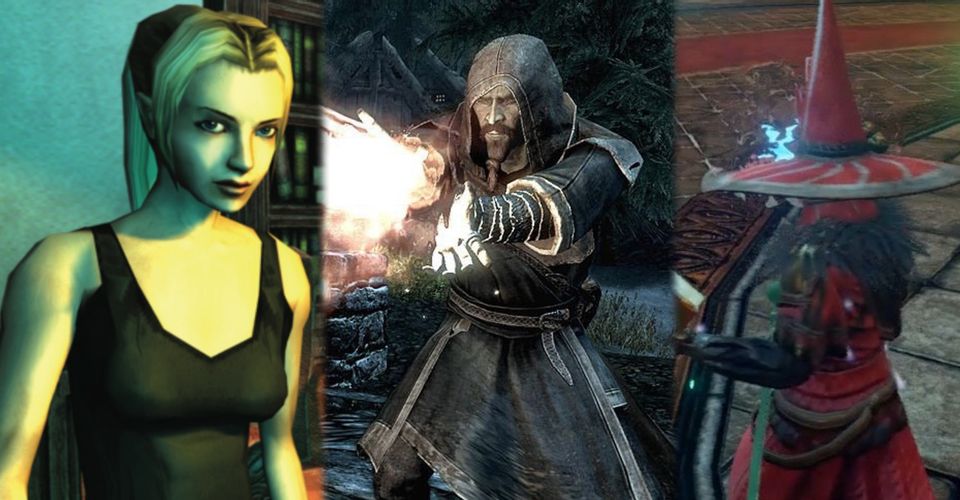Video Game Magic Systems That Break the Mold

Many of the biggest, most popular fantasy RPGs and MMOs out there – World of Warcraft, Guild Wars, Diablo III, etc. – use the same style of magic system, where wizards spend blue-colored Mana to cast fireballs or magic missiles. The following games, however, have introduced systems of spellcasting that are narratively and mechanically distinct, reinventing magic as a more mysterious, dangerous, and astonishing phenomenon.
There’s a big level of difference between magic in video games and magic in popular myth. For starters, most magical traditions in real-life revolve around slow, stately ritual and ceremonies that wouldn’t be fun in the context of a game. Secondly, most traditional magic revolves around the invocation and conjuration of spirits, gods, angels, and demons to perform the actual deed – a quasi-religious paradigm at odds with most fantasy fiction, where magic is treated as a sort of arcane science.
Fictional systems of magic often tend to fall into two popular categories. In the first system of magic, called “Vancian Magic” after the Dying Earth series of books by Jack Vance, magicians memorize a long list of spells in their brains, then forget the spells after casting them. This system of magic can be seen in Dungeons & Dragons and the first two Dark Souls games. In the second system of magic, the so-called “Mana System,” magicians have access to a pool of internal magic energy they can draw on to cast spells, commonly referred to as “Mana,” “Ether,” “Spirit,” “Focus,” etc. This magic system is common in fantasy video games like Diablo or World of Warcraft because it’s easy for players to grasp and for developers to design. The issue with these two systems of magic is that their sheer ubiquity can make magic seem mundane and not at all miraculous. By creating new, unconventional systems of magic, the following games make the idea of magic seem, well, magical again.
The Elder Scrolls V: Skyrim and Its Dragon Shout Magic

The first four Elder Scrolls games had fairly traditional magic systems. Spellcasters drew on a blue-colored energy source called “Magicka” to cast spells in the magical schools of Destruction, Conjuration, Alteration, Restoration, Illusion, and Mysticism, and learning new magic was simply a matter of leveling up and buying a spellbook from the right trainer.
The big innovation of The Elder Scrolls V: Skyrim lay in how it introduced a uniquely primal and flavorful form of magic called the Thu’um, in which practitioners shout reality-altering words of power derived from the language of dragons. To learn new Dragon Shouts in Skyrim, the Dragonborn protagonist must delve deep into ancient dungeons to find ancient inscriptions on which the ancient language of dragons is carved. To master these words of power, the player must hunt down ancient Dragons and devour their souls.
Pillars of Eternity’s Afterlife-Powered Magic

The magic system of the Pillars of Eternity RPGs owe a lot to the magic systems from the Baldur’s Gate series (themselves taken directly from classic Dungeons & Dragons). Wizards memorize spells from their Grimoires, Priests invoke miracles handed down by their gods, and Druids channel the power of nature. The big narrative twist to all these arts of magic is that they’re all fueled by the power of Souls – the soul energy of the practitioner, plus fragments of souls drawn from the afterlife where disembodied souls linger before reincarnation. Depending on the character class and build a player chooses in the Pillars of Eternity games, they can read minds, access memories of a soul’s past life, or even summon the spirits of dead heroes by singing songs about their legends.
Outward’s Complex Ritual Magic

When developers at Nine Dots started designing Outward, their goal was to make a game that depicted the realistic challenges a fantasy adventurer would likely face when adventuring out in the wilds. To this end, they added survival and crafting mechanics to their indie fantasy RPG, generating gameplay in which player characters needed to cook food, craft potions, bandage their wounds, and find safe locations to camp for the night.
This emphasis on managing provisions and preparing for enemy encounters carried over to Outward‘s complex magic systems, which require spellcasters to prepare magical circles, trace different combination of runes, and apply enchantments to their weapons in order to cast spells at their fullest potential. The process of acquiring Mana for spell-casting is also complex: would-be mages must travel to a conflux of Ley Lines and sacrifice a portion of their health and stamina in order to gain Mana, then rejuvenate their Mana by cooking various kinds of seafood dishes.
Eternal Darkness: Sanity’s Requiem & Eldritch Rune Magic

The survival horror game Eternal Darkness: Sanity’s Requiem is, unsurprisingly, big on the whole insanity theme, with different protagonists from different eras fending off frightening monsters, evil sorcerers, and sinister Lovecraftian gods while losing their sanity in the process. Fittingly enough, the magic system of Eternal Darkness is very thematically sinister and uncanny. Players gain the ability to cast magic after acquiring the Tome of Eternal Darkness, a spellbook bound in human skin and bone. Over the course of gameplay, they unlock new spells by acquiring magical runes, finding scrolls with formulas for spells, then arranging their runes within the slots of magical circles.
There are countless ways game developers can convey magic in video games, but the titles listed above take things one step further and actually imbue their magic systems with the game’s lore and narrative to create something unique.
About The Author
















